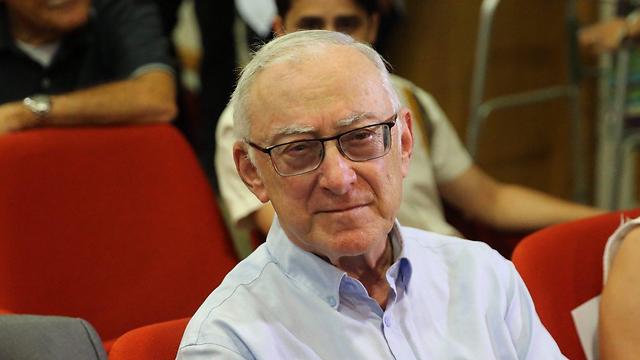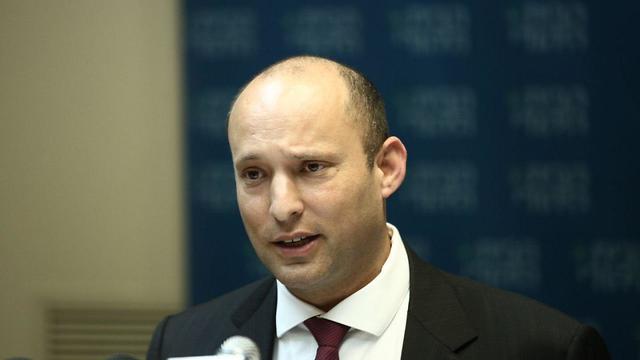

Controversial academic ethical code advances
Council for Higher Education's subcommittee decides to adopt regulations barring lecturers from taking part in academic boycotts as well as prohibiting discrimination against lecturers or students over their political views; universities and colleges will be required to incorporate them into their disciplinary code, despite objections from university heads.
A controversial ethical code, which was met with strong opposition from Israeli academics, has been approved by a subcommittee of the Council for Higher Education, moving it another step closer to becoming binding.
The ethical code, written by Prof. Asa Kasher at the request of Education Minister Naftali Bennett, includes a clause barring lecturers in academia from expressing political views in class unless it is relevant to the course, such as in political sciences.
While Education Minister Bennett claimed the code "is not against any political side," academics claimed it is an attempt to silence left-leaning political views.
Despite the strong disagreements, a subcommittee of the Council for Higher Education has decided to adopt the ethical code, instructing universities and colleges in Israel to incorporate most of its clauses into their disciplinary code. The ethical code will be enfoced, and lecturers who violate the code could face disciplinary action.
The subcommittee of the Council for Higher Education examined the ethical code written by Kasher, while holding discussions with representatives of the different academic institutions and hearing their reservations. The discussions ended with a statement that the Council for Higher Education recognizes that academic freedom and academic excellence are of utmost importance and completely rejects “politicization in the academy.”
The new ethical code will now be sent to the heads of the universities for their input. After they provide their notes, the ethical code will be returned to the subcommittee for further discussion, following which it will release an amended version based on the comments from the academic institutions. The amended version will then be brought to the Council for Higher Education for discussion and final approval.
It is still unclear whether universities and colleges will be required to include in their disciplinary code the contentious clause that states that "A lecturer is prohibited from abusing the teaching platform given to him by systematically and inappropriately preaching a political view that clearly exceeds that which is required in the course's syllabus in its broad context."
However, academic institutions will most likely be required to include a prohibition to discriminate against or take action in favor of lecturers or students because of their political views, as well as a prohibition from taking part in an academic boycott against Israel or in any activity that promotes such a boycott.
The Council expects universities and colleges to enforce the clause barring lecturers from expressing political views in class, even though it might not include it in the list of clauses it requires academic institutions to adopt. If this clause is not enforced, the Council will consider making it a requirement for the disciplinary code in the future.
"We must keep the world of academic free of politics and foreign interests," Bennett said over the weekend. "Complete academic freedom - yes. Promoting political agendas and calling for a boycott - no. We are in fact limiting the freedom of condemnation and increasing the freedom of expression, so the academic discourse in Israel remains free of politics and discrimination. At the gates of academia, leave politics outside."
On Sunday morning, the education minister posted the ethical code that was approved, writing: "Read it. Every word makes sense."
‘Ethical code will harm academic freedom’
VERA, the Association of University Heads, issued a strong condemnation of the Higher Council for Education's decision to adopt the ethical code.
"The Council subcommittee's interim decision leaves the ethical code as one that creates political censorship, tramples the most basic principles of academic and research freedom, and is meant to silence," VERA said. "This is a 'Big Brother' for the government meant to turn higher education into a pawn for politicians."
"We can already see dangerous deterioration of the freedom of expression and academic freedom towards the abyss, something that is common in dark countries and not in countries that pretend to be democratic," the VERA statement continued.
"The universities will not accept the diktats from 'above' and have no intention of being used as pawns to serve narrow political interests. We will continue fighting for free academia, free research and the freedom of expression in the democratic State of Israel."
Prof. Joseph Klafter, the head of VERA and the president of Tel Aviv University, dubbed the ethical code "an effort to silence" and "political censorship," and stressed "We won't let there be a 'thought police' here, this is something we cannot accept."
Prof. Alberto Spektorowski of the Department of Political Science at Tel Aviv University said, “In general, I’m not in favor of the ethical code. I don’t believe universities need an ethical code. People in academia can and should say what they want. The ethical code can spill from one thing over to another, and at the end of the day it’s a tool for limiting freedom of speech.
“It’s a bad move that contributes nothing. Lecturers will think twice on how to word what they want to say, and that’s not a good thing. Academia should be a free place to express what we think. As soon as the ethical code is introduced, it will harm academic freedom.”
Dr. Gal Ariely from the Department of Politics and Government at Ben-Gurion University, agreed: “The people promoting the ethical code are supposed to have national pride, and they are using the state’s tools to silence other people. On the fundamental level, I feel sorry for the people who came up with this ethical code, because they have no confidence in Zionism. A person with self-confidence isn’t afraid of words like 'Nakba' or 'occupation'; he is willing to deal with them in an opinion marketplace. I was sure Zionism is stronger than this, and it’s sad.
“This entire move is the result of insecurity. Students in the State of Israel are capable of dealing with a wide variety of opinions. The ethical code wasn’t formed to stop the class from turning into a stage for political opinions. It’s part of a wider move to limit and restrict academia’s power.”
'An important step towards a decent academia’
On the other hand, there were lecturers who spoke in favor of the ethical code. Dr. Tal Sadeh of the Department of Political Science at Tel Aviv University asserted that “academia should remain as apolitical as possible. The university is a national institution living on public funds, it’s not private property, so I personally avoid promoting my political views in class. If I do so, I announce it in advance. I have no problem, with the principle of the code. Academics' job is to express their political opinion outside class."
“I know it’s hard, and I know I’m a minority opinion,” Dr. Sadeh added. “Clearly, we have political opinions, and they’ll have an impact in different ways, but the class shouldn’t be turned into a stage for the lecturers’ personal political views. A person who engages in the instruction of politics isn’t teaching. As for the students, those who come to hear what they believe in won’t learn anything. The students have a duty here too, which includes listening to intolerable opinions. The right of expression should be completely free in the university, but the lecturers are responsible for teaching, not for turning class into a stage for personal political opinions.”
Ram Shefa, chairman of the National Student Union, stressed that “The reports are misleading and miss the real point—there is no code. There is freedom of speech, for students and lecturers. Almost every article worded by Asa Kasher at the time wasn’t included in the ethical principles that an institution must choose how and whether to adopt. There is no enforcement from above and academic freedom remains in the hands of the institutions.
“I had the privilege of being part of the narrow panel that outlined the principles, and I can wholeheartedly say that it’s pro-students, pro-academia and nowhere near the silencing that was expected. I recommend that every person read the document before issuing distorted, festive statements.”
Matan Peleg, chairman of the right-wing Im Tirtzu organization, said: “The final wording of the ethical code in academia touches on the most important points concerning the wild political activity of lecturers and institutions in Israel, and we see that as a great success.
“This code should be seen as a first step, but definitely not a final one. The last school year was a record year in terms of anti-Zionist political activity. Lecturers compared Israel to Nazi Germany, others openly promoted a boycott of the University of Ariel, and other institutions were enlisted for the political campaign against the government’s policy on infiltrators, abusing publicly-funded media outlets and means of publication, so the education minister still has a lot to deal with.
 |
“In the reality of politicization in academia, the wording of the current code are almost too late. Allowing institutions to word their own ethical code and leaving the enforcement in the hands of the institution is like letting the fox guard the henhouse. The lack of financial sanctions against institutions that fail to meet the demands may take the edge off the entire move. This is an important step in the battle for a decent, sane academia, but we still have a lot of work to do.”


















